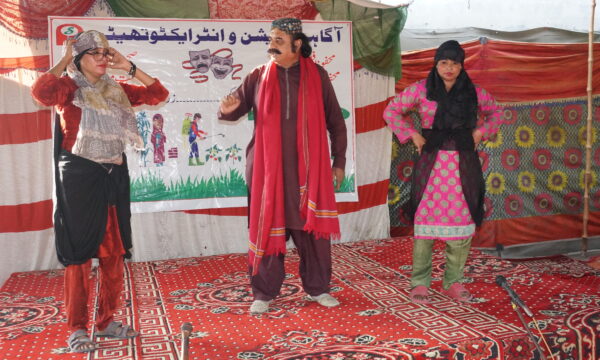
A parasitic wasp foraging for eggs on the underside of a leaf. Photo: CABI
Human health issues arising from the use of synthetic pesticides and concerns about their environmental toxicity are making lower-risk alternatives increasingly attractive. Biological control agents are living organisms which reduce harmful pest populations. Many people know of the common ladybird, whose larvae feed on aphids, but a wide range or biological control agents – e.g. predatory and parasitic insects, diseases of plant pests – are available. However, their use is still limited, in particular in low- and lower-middle-income countries.
Extension services play a vital role in the uptake of biological control agents by farmers; obviously if they’re being recommended this will increase the chances of farmers adopting them. The study analysed pest control recommendations given by extension services in the Plantwise programme in three African and three Asian countries. It examined factors that affect the uptake of biological control agents by extension services.

Caterpillar larvae: healthy (right) and killed by a bacteria (left). Photo: CABI
Globally, appropriate biological control agents were available for most of the major pests present in the study countries. However, they were often not available at a national level. Nationally available biological control agents were not always included in recommendations by extension services. This might be explained by restricted availability and perceived higher price of biological control agents at local agro-inputs shops, but might also reflect a lack of awareness among extension services of the biological agents that could be used for particular pests. By identifying the factors that affect the uptake of biological control by extension services, the study highlights areas were key players in plant protection can prioritise action to ease their use.
Contributed by Julien Dougoud. To learn more about the uptake of biological control and the factors affecting it, read the full article for free in BioControl→
Citation: Dougoud J., Cock M.J.W., Edgington S. & Kuhlmann U. (2017) A baseline study using Plantwise information to assess the contribution of extension services to the uptake of augmentative biological control in selected low- to lower- middle- income countries. BioControl. DOI:10.1007/s10526-017-9823-y
2 Comments
Leave a Reply
Related News & Blogs
Biocontrol that goes the distance: Acerophagus papayae in Kenya
Acerophagus papayae can slow the spread of the invasive papaya mealybug and benefit the wider community. Recent monitoring efforts have shown that the natural enemy is reaching long distances away from the original release sites. Papaya mealybug attack…
20 May 2025





Reblogged this on The Invasives Blog.
hello plantwise, your blog has really impacted to my science life, please help me understand how I can control bortrytis in a cool chain of rose flowers store.